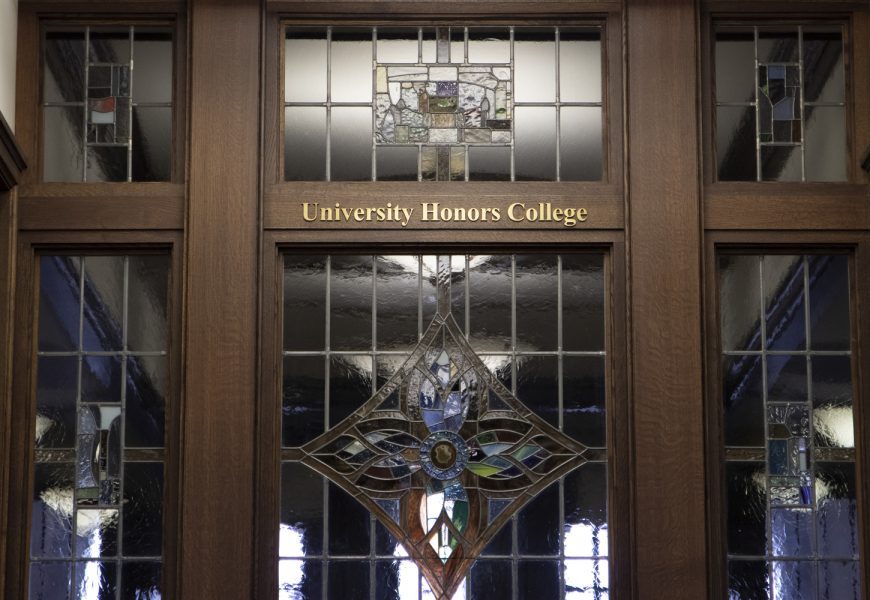Opinion | There is little opportunity for humanities majors in the Honors College
Caela Go | Senior Staff Photographer
The honors college on the 36th floor of the Cathedral of Learning.
April 11, 2022
I absolutely love it here at Pitt. The classes I’ve taken are interesting, the professors are great and being a part of the student community is a fun experience.
While trying to create a degree plan, I realized that as a political science and sociology major, planning to graduate with an honors degree would be more difficult than I originally anticipated. I knew it would be harder, but I did not expect the lack of opportunities that the Honors College seems to offer non-STEM majors. There are options available to them, but they’re hard to find due to poor communication with honors students.
According to the Honors College’s website, there are a handful of ways to go about graduating with honors. The first way is to simply take enough honors and experiential credits — research, independent study and certain study abroad programs — on top of the Outside of the Classroom Curriculum, made up of extra seminars or tasks you have to complete in order to rack up points on the Suitable app. It takes 18 honors credits and six experiential credits to complete that requirement, and the other curriculum isn’t too bad, requiring 1,200 points, estimated to take about five to eight semesters.
For those who wish to pursue this option, humanities-based classes are currently few and far between. But if you don’t take at least one honors class a year, you could potentially be put on probation and potentially removed from the college.
If taking that many classes on top of your major’s requirements seems too difficult, there’s also the BPhil route. A Bachelor of Philosophy is another kind of degree you can earn through independent research, along with writing and defending a thesis during your undergraduate education. But students who apply to the program know that it requires more effort than a standard BA or BS in order to get a BPhil. It’s time-consuming and difficult work and, honestly, unless you want to pursue research or further education, it’s not all that worthwhile.
The main issue is that finding opportunities as a non-STEM major proves difficult due to a lack of communication from the Honors College. There are definitely opportunities for humanities majors — they just aren’t made very accessible for students planning their honors path on their own.
In a conversation with David Hornyak, the Honors College’s assistant dean, he explained just that. He said he wants students to “read, write and think across disciplines” by taking an array of classes. Even though that may mean taking a STEM class or two, Hornyak said “another option that we have is working together with some of the professional schools, like the law school, [where] we have some law courses that are designated for honors students.”
I think classes in the graduate schools would be beneficial to non-STEM majors more than anything else. They give you that challenging environment, while still falling in line with the interests of many students. This opportunity is here for us, but it is not clearly presented as an option, and it’s one you need to learn about yourself and speak with your adviser on.
If you just wanted to take the regular honors courses, there are few options for humanities majors. Looking at the selection of honors classes for the fall 2022 semester in PeopleSoft, there are a total of 49 honors courses being offered to students. Most of the classes are either entirely STEM or humanities courses that have something to do with science, medicine or math in some way. From my perspective, these classes appear to be curated for STEM majors fulfilling their humanities gen-eds, instead of also appealing to humanities majors.
Hornyak said he encourages students to reach out to honors faculty about classes that they believe should be offered at an honors level.
“If you were in a class and they were really good and/or the class is really enjoyable, encourage them to submit the course as an honors course,” Hornyak said.
In part due to the COVID-19 pandemic, the Honors College seems to have fallen behind on its communication with students. Now that regular operations seem to be returning, current students have to navigate and tell the faculty what it is they want in an honors education. Future honors students will reap the benefits of our communication, but we won’t, necessarily.
The Honors College is taking steps to listen to students and implement the classes and programs that students want to take. There are talks to establish a student council to speak directly to Honors College faculty and require mandatory meetings with honors advisers to keep students on track. The student council would offer opportunities for students to speak directly with the faculty and tell them exactly what we want. Mandatory advising would also keep students updated on all the opportunities that the honors college has for us.
If Pitt is going to advertise the Honors College to all majors, there need to be more courses and opportunities available to students across all subjects and disciplines. Luckily, Hornyak detailed plans to expand the Honors College curriculum and add more opportunities for non-STEM majors in multiple different ways.
In order to find the best path to completing your honors degree, do not hesitate to reach out to your honors adviser and look at different options. At first glance, there may not appear to be appealing, accessible options, but with proper communication and conversation with your advisers and other faculty members, there is more flexibility when pursuing an honors degree.
Livia LaMarca mostly writes about American politics and pop culture. Write to her at [email protected].









